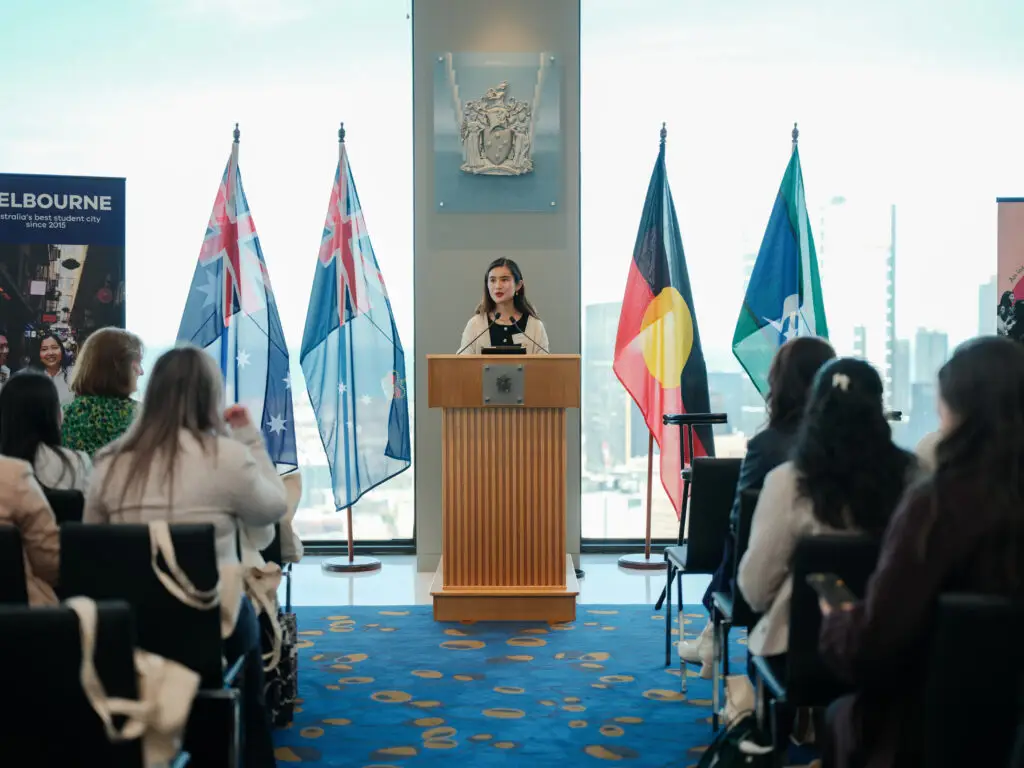‘Lol.’ I forwarded a post about the anti-immigration protests to my siblings who live in Melbourne and Brisbane respectively: ‘Stay home this Sunday. Nutters are out.’
Last Sunday’s ‘March for Australia’ protests claimed it wants ‘an end to mass migration’. The over 1.1 million people in Australia who were born in the United Kingdom remain to be the largest migrant community in Australia, but we all know they’re not the ‘migrants’ the protestors referred to.
We are used to sharing info like this for general awareness and alertness: during COVID when Asian students were targeted racially in public; before that a string of mobile phone robbery near the University of Melbourne, and there’s many more. Those were unnerving.
Speaking to my friends and family, I found it curious that many of us, who came to Australia as international students and first-gen Asian migrants, were largely unfazed by the protest. So I got to wonder, why are we not more terrified that approximately 15,000 people showed up to essentially protest our existence?
I reckon it came down to two things:
Firstly, blatant racism is nothing new to us. Every person of colour in this country, especially those of us who speak with a non-European accent, has experienced racism. From navigating a visa system that is frankly quite dehumanising, to getting called racial slurs just minding our business walking down the street – we’ve all experienced it, if you live in this country long enough. The Neo-Nazis did play an ugly part in the protests, but we can’t pretend that your ‘average Australians’ do not harbour some xenophobic sentiment too.

In fact, it actually is quite refreshing to get to talk about racism openly without being gaslit that racism doesn’t exist in this country. We experience racism when our resumes get screened out at the sight of our names, when we are portrayed negatively in the media. We also experience racism when we are spoken to in a condescending tone, when we are ignored, or made fun of on the basis of our race. Subtle racism is not subtle to those who are at the receiving end of it.
Secondly, at least the major party politicians and mainstream media seem to be on our side this time. I felt a massive whiplash seeing the Prime Minister Anthony Albanese and Opposition Leader Sussan Ley condemning the anti-immigration rallies, after immigration and international students were used as a political football in the lead up to the 2025 Federal Election. Oh by the way, last month, the Government actually lifted the proposed international student caps, after a massive dog-whistling kerfuffle in 2024 fed by both major parties.
So, where does this leave us?
We, the migrants, are inclined to brush this off as another day in Australia. Because we are tired, and we just want to keep our heads down.
I was being slightly facetious when I said we don’t care about the hate messaging that the protestors sent. Every experience and witnessing of racism leaves a mark – it makes us feel less safe, less welcomed, less valued as human beings.
The migrants that I know worked twice as hard, paid a much higher cost financially and otherwise, and faced more struggles to build their lives here. They contribute more to Australia, are always so grateful, and ask for less.
This is not just anecdotal, and numbers have demonstrated this over the years. Data from the Productivity Commission (2016) and Treasury modelling (2021) showed that skilled migrants contributed more in taxes than they consumed in government services. On average, $198,000 more (2021) in our lifetime. Temporary migrants like international students and graduates further pay taxes but are excluded from many welfare benefits like Medicare, JobSeeker, and HECS.
There are legitimate policy discussions to be had about immigration, indeed.
If we were to have a real evidence-based discussion about immigration, we would talk about how it is absolutely necessary for Australia’s future. We would talk about how without migration, Australia’s population ageing will worsen, the workforce will shrink, and healthcare, pension and social services risk collapsing.
If we were to really debate about immigration, we would bring up how without migrants, Australia’s skills gaps will dramatically widen, resulting in critical shortages in aged care, nursing, and teaching. Even outside of the occupation shortage list, Australia will lose out on the global talent race of skills, networks and innovation.
If we were seriously considering issues relating to immigration, we would be alarmed by the institutional exploitation that migrants face, from the exorbitantly high visa fees, to the inefficiency of the skill assessment systems; from underemployment and underpayment, to pushing migrants into skill-starved regional towns without adequate support, to racism and discrimination that threaten individuals’ safety and wellbeing.
There are legitimate policy discussions to be had about immigration, but last Sunday’s protests are not it, nor are most of the ‘conversations’ people pretend to have. The protests shouldn’t be brushed off as ‘good Australians… hijacked by Neo-Nazis’. These extremists are dangerous. At the same time, we need to face head-on the racism that exists and is embedded in Australia.
At the end of the day, we are all migrants on these unceded lands of Aboriginal and Torres Strait Islander people. If these protestors truly want to reverse migration, I suggest they start packing their bags.
These opinions are the author’s own views and not that of their employer.
If you require confidential support, the following services are available:
Lifeline: 13 11 14
Beyond Blue: 1300 22 4636
Racism. It Stops With Me: https://itstopswithme.humanrights.gov.au/take-action/support-services
Top photo – Pictured: Belle Lim, Source: Supplied

